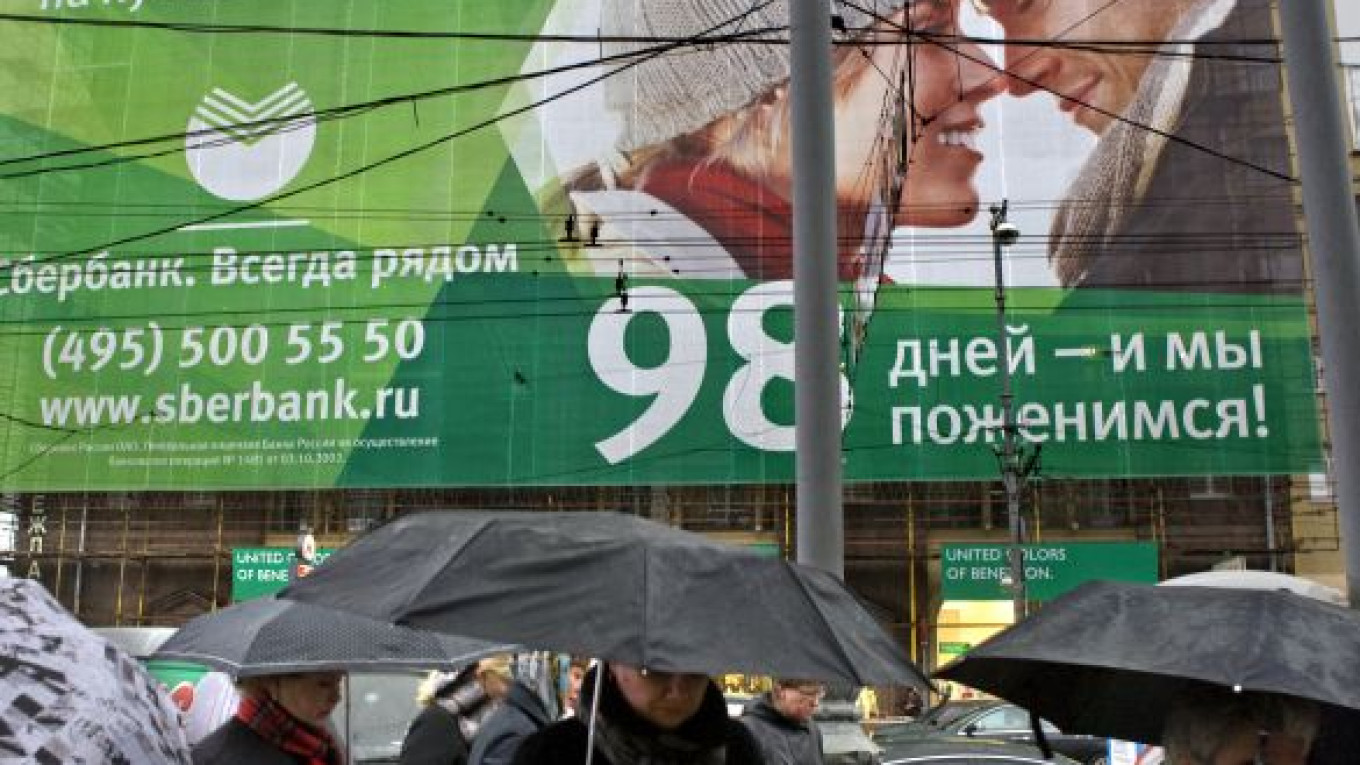Sberbank has reduced its interest rates for ruble deposits to precrisis levels, the latest cut to an indicator that many experts consider more reliable than Central Bank rates for setting the cost of money in Russia.
The country's largest lender reduced its rates for private individuals on Friday, a Sberbank official said over the lender's hotline. According to Vedomosti calculations, the rates were cut by 1 to 2 percentage points. The move will likely bring lower borrowing costs and a wave of reductions at other banks.
"When I saw the new [Sberbank] rates, I couldn't believe my eyes — They almost looked like they were for foreign currencies," said an executive at a major bank. "I didn't expect such a galloping speed for the reductions. At this pace, we'll fall below inflation."
According to Vedomosti calculations, Sberbank had 54 percent of all individual deposits in Russia as of Dec. 1. Bank of Moscow vice president Andrei Lapko said the latest reductions might have stemmed from record cash inflows from individual depositors in December — 230 billion rubles ($7.7 billion), or more than 35 percent of the full-year total.
"I'm 80 percent certain that Sberbank, the largest player on the market, will be followed by others. We're going to analyze the level of rates, and maybe we'll reduce them, too," Lapko said. The decision has less to do with inflation than maintaining the bank's position as a lender, which is crucial now, he said. If Sberbank is attracting money for less, it will also be able to offer cheaper loans.
Lowering the cost of borrowing leads, with a certain lag, to cheaper lending, said Vladimir Tikhomirov, chief economist at UralSib. It's an even more important indicator than the Central Bank's refinancing rate because the regulator still hasn't become a source of long-term cash.
Sberbank will only feel the move's impact in a few months, once the percentage of deposits opened or prolonged under the new rates becomes noticeable, said a former manager at the bank.
A current Sberbank employee warned that companies should not expect an automatic decrease in corporate lending rates, which are determined on an individual basis and depend on the lender and the project. But with time, they will fall, the banker said.
Sberbank's share in the overall lending portfolio is more modest than for deposits, but it's still fairly significant, at roughly one-third of all loans to individuals and companies outside the financial sector.
The reduction brings Sberbank's rates back to August 2008 levels. In November 2009, Central Bank Chairman Sergei Ignatyev, who also heads Sberbank's supervisory board, warned that lending and deposit rates could drop to precrisis levels — and soon.
Alexander Dolgopolov, deputy head of Vozrozhdeniye bank, said the trend of decreasing returns on deposits that began last fall would continue. "We've cut rates three times since November, and we might do it again soon. Banks increased their rates to keep depositors, and people's trust after the peak of the crisis returned quickly. We had a bigger inflow last year than before the crisis, even though we never had really high rates. Meanwhile, banks' credit portfolios shrank, and lending in general hasn't recovered like deposits have. So the inflow of deposits is surpassing banks' needs."
According to BDO's macroeconomic research center, returns on deposits were above inflation levels for the first time in 2009.
This year, deposit yields will also be about 1 percentage point above inflation, said Georgy Gorshkov, a member of VTB24's management board. The Economic Development Ministry's official inflation forecast for 2010 is 7.5 percent.
In January, demand for deposits, inflation and VTB24's margin will definitely allow it to keep rates at current levels (8.5 percent to 10.5 percent for deposits of six to 13 months), but many banks in the top 30, which still offer deposits paying 14 to 15 percent, will be forced to reduce them soon, he said.
Gorshkov said he also expected the consumer credit market to increase this year by 10 percent to 25 percent.
The Central Bank has been setting the example for Sberbank and its other wards: It has reduced its refinancing rate to 8.75 percent from as high as 13 percent last year. That was possible thanks to slowing inflation, which reached 8.8 percent in 2009 — Russia's lowest annual total, ever.
Lending rates have already returned to precrisis levels, and the trend will continue, barring some external shock or a surge in inflation, Tikhomirov said. But he said he thought that the interest rates did not reflect the real situation in the economy, since the majority of small and midsize companies still are unable to take out loans.
Banks aren't ready for risk, and companies aren't ready to increase their debt load. But with the cost of loans decreasing, borrowing could begin to pick up, Tikhomirov said.
A Message from The Moscow Times:
Dear readers,
We are facing unprecedented challenges. Russia's Prosecutor General's Office has designated The Moscow Times as an "undesirable" organization, criminalizing our work and putting our staff at risk of prosecution. This follows our earlier unjust labeling as a "foreign agent."
These actions are direct attempts to silence independent journalism in Russia. The authorities claim our work "discredits the decisions of the Russian leadership." We see things differently: we strive to provide accurate, unbiased reporting on Russia.
We, the journalists of The Moscow Times, refuse to be silenced. But to continue our work, we need your help.
Your support, no matter how small, makes a world of difference. If you can, please support us monthly starting from just $2. It's quick to set up, and every contribution makes a significant impact.
By supporting The Moscow Times, you're defending open, independent journalism in the face of repression. Thank you for standing with us.
Remind me later.


